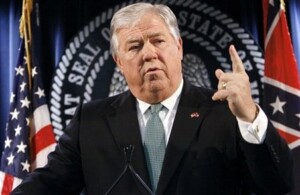
One would think it newsworthy that the Chairman of the U.S. Senate Judiciary Committee wrote a letter to the U.S. Attorney General informing him that the former Chairman of the Republican National Committee (cum Washington powerbroker) is, in opinion, violating federal law. Yet, before the Hattiesburg Patriot News Media’s report this week, no other news outlet in the country had reported on the failure of Haley Barbour’s powerhouse lobbying firm to comply with the Foreign Agents Registration Act (FARA). Why? There are several possible answers to that question, but more important are the reasons why the Patriot did report the story.
First, the notion that a select few have direct access to and influence over our governmental officials, a privilege not shared by or available to all citizens, is antithetical to basic principles of our democratic form of government. Over 100 years ago, U.S. Supreme Court Justice Harlan based his disagreement with the Court’s since-rejected opinion in Plessy v. Ferguson on the fundamental premise that
“there is in this country no superior, dominant, ruling class of citizens. There is no caste here.”

That, unfortunately, is simply not true. The fact is that, in our country, the wealthy are a “superior, dominant, ruling class of citizens.” That this is so in most other countries and throughout history does not make it right. This is America. It is not supposed to happen here. Especially not today.
Among the many special privileges unique to the wealthy, perhaps the most pernicious is their ability to influence governmental decision-making, which they accomplish by their employment of lobbyists. Lobbyists make no bones about the fact that it is their job to obtain special favor from our government officials on behalf of the privileged few who can afford to pay them. Day in and day out, lobbyists persuade lawmakers and administrators to act – or not act – in their clients’ best interests, and make decisions that are often inconsistent with or even contrary to the interests of the electorate.
The practice is disturbing enough when exercised by American citizens and companies, but most would be alarmed to know that it is also being aggressively employed by foreign countries and organizations with interests adverse to our own. Foreign interference governmental decision-making is a form of economic warfare when aimed at capturing or otherwise controlling the supply of critical economic resources. Without some measure of control and oversight, it can threaten our nation’s security, and may in some circumstances rise to the level of an existential threat.
Enter the Foreign Agents Registration Act (“FARA”). FARA was originally enacted in 1938 to counter clandestine foreign use of American firms and citizens to spread Nazi and Communist propaganda in the United States. However, its fundamental purpose remains as important today as when it was enacted – to ensure that the American people are informed of the source of information and the identity of foreign attempts to influence U.S. public opinion, policy and laws.
FARA is a procedural statute, not a substantive one. It does not prohibit particular activities in the abstract; it merely requires that those engaged in such activities on behalf of foreign interests identify themselves (and disclose their interests) to the U.S. government. Under FARA, each agent of a foreign principal must file (and periodically supplement) a comprehensive registration statement with the Attorney General disclosing, among other things: the identity of the foreign principal represented; the issues to be lobbied; the services the agent intends to provide; the lobbying activities actually performed; the financial arrangement between the agent and foreign principal; and any payment(s) the agent receives.
Over time, the Act has been redefined and refocused to require reporting of a broader range of activities by corporations, lawyers, lobbyists, and public relations firms regarding their efforts to influence the political and governmental processes on behalf of foreign entities in both the public and private sectors. Greater attention has recently been focused on the roles of those who advocate on behalf of foreign interests. For example, FARA was used as a basis to prosecute former National Security Advisor Michael Flynn (who belatedly registered under the statute after it was discovered that his lobbying firm received $530,000 for work on behalf of a Dutch company with ties to the Turkish government); and former Trump Campaign Manager Paul Manafort, who is alleged to have received far more money from Oleg Deripaska (a Russian billionaire with close ties to Vladimir Putin) to promote various Russian interests.
Now back to Barbour. With offices in Washington, D.C. and London, Barbour’s firm (BGR Holdings, LLC and its subsidiaries) is one of the most powerful lobbying firms in the country. BGR makes no secret about what it does for its clients, proudly touting on its website that the firm “specialize[s] in creating, implementing and changing public policy. Whether you seek new legislation, need to modify regulation, or want to put a stop to adverse legislation, we have the skills to achieve results under the most difficult of circumstances.” And just how does BGR do that? Through its “longstanding relationships with key government and business decision-makers in Washington” with whom BGR “facilitate[s] introductions.” All of this, BGR says, “translates into a competitive advantage for our clients.”
BGR’s list of clients on behalf of which it “lobbies” American elected officials and administrators is long and impressive. In 2013 the firm was paid $13.7 million for lobbying and its three largest clients were the Republic of India, Ukraine Chevron Corp. and the State of Kazakhstan. In 2014 it was widely reported that BGR Group was “at the center of [a] lobbyist network” supporting Republican Senator Thad Cochran, while he fought a tight primary election race against Tea Party candidate, Chris McDaniel. In April 2015, the Government of South Korea retained BGR for public relations and image building.
BGR cannot possibly be unaware that its activities fall squarely within FARA, or that the willful failure to register and/or disclose its activities can subject it to both civil and criminal penalties. One must therefore ask why a sophisticated, experienced lobbying firm like BGR would fail to comply with the Act’s seemingly simple requirements. The reasons may not be nefarious, and the answer may be innocuous. But the question is worth asking, and the issues raised by Senator Grassley’s letter involve matters not only of public trust, but potentially of national security.
U.S. Senate Judiciary Committee Chairman, Chuck Grassley’s, letter to Jeff Sessions
barbour
Paul Manifort’s Indictment
manafort

